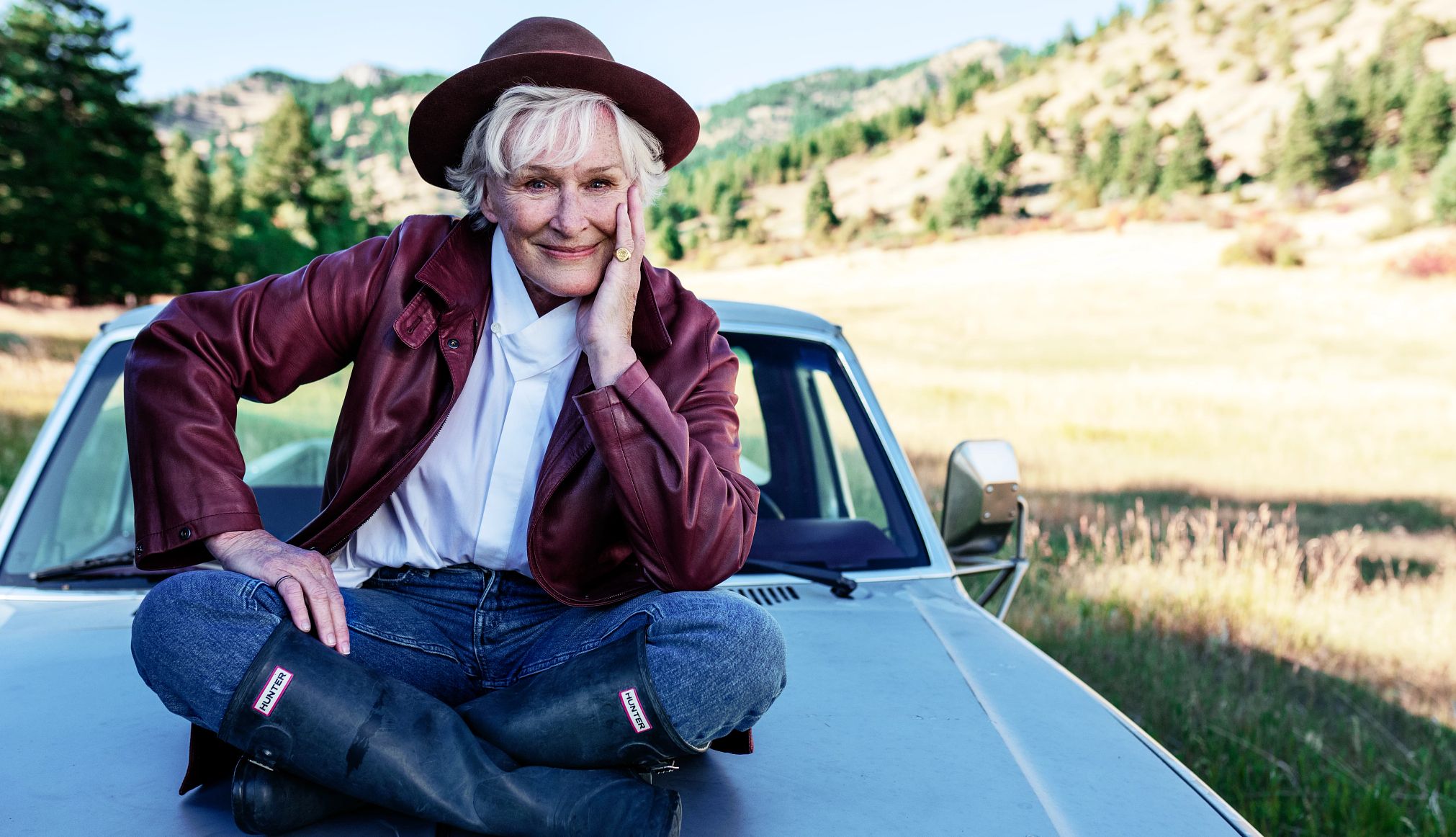AARP Hearing Center
Glenn Close peers through the windshield of her blue pickup and surveys a smoky Montana sky.
“We’ve got fires all around,” she says, as she navigates the road through the haze—past bucolic fields of wheat and quaint schoolhouses—her faithful Havanese dog, Sir Pippin, perched by her side on the armrest. Even for someone used to a dramatic scene, the actress is stirred by the visuals en route to her plot of land in tiny Belgrade, Montana, nestled between the Bridger Mountains and the winding East Gallatin River.
“It reminds me of a poem,” she continues, reciting lines from Yeats — something about gardens, chaos and survival.
Arriving at an isolated homestead with old barns, a weathered granary and a creek running through it, Close, 77, hops out, Pip closely following. Close is petite, but somehow rugged as a farmhand in her faded jeans, plain shirt and vintage-inspired sunglasses. Her cropped silver hair is brushed away from her patrician cheekbones and placid face — a canvas for a multitude of characters audiences have loved and loved to hate over the years.
The actress has been living in nearby Bozeman since 2019 and is now building a second house on this bit of rural paradise. Here, she’s surrounded by family (three of her four siblings and her daughter, Annie, live a stone’s throw away) and far from the madding crowds of Hollywood and Manhattan. “I need nature to survive,” she sighs, giving Pip a pet. “This is our sanctuary.”
It’s understandable why she’d gravitate to such a serene haven.


The actress’ 50 years in film, television and stage are populated by chilling characters that have kept generations of audiences at the edge of their seats: jilted, rabbit-killing Alex Forrest in Fatal Attraction (“I won’t be ignored, Dan!”); villainous 18th-century French noblewoman Marquise Isabelle de Merteuil in Dangerous Liaisons; and, recently, the demon-possessed grandma in The Deliverance, to name a few.
But she’s also known for her strong, sturdy, salt-of-the-earth women—perhaps more like Close herself — who struggle against adversity or oppression: Jenny Fields, the feminist nurse in The World According to Garp; Midwestern mail-order bride Sarah Wheaton in Sarah, Plain and Tall; and the long-suffering and sacrificial sister, Férula Trueba, in The House of the Spirits. The list goes on.
They’re the kinds of performances that inspired Vanity Fair to dub Close “one of the great actresses of our time” and enabled her to accumulate, so far, eight Oscar nominations and a slew of Emmy, Golden Globe and SAG Awards.
“I honestly don’t think about awards that much,” she says, as she hauls a cooler from the back of her truck and swings it onto a wooden picnic table by the creek. She’s packed lunch for us—tuna and apple salad with cinnamon donuts. “I feel I’ve done a good job if my work is resonating with people.”
Having said that, she’s delighted about her Career Achievement Award, which she’ll accept at AARP’s upcoming Movies for Grownups Awards, because she, too, gets frustrated when she turns on the TV and can’t find something good to watch, something for grownups.
“It’s great to accept this award. My sister Jessie and I watched an old movie last night, and God, it was so wonderful. What was it called? Afterwards, we said, ‘Boy, they used to make really good movies.’ It was certainly a film for grownups.” (She texted the next day with the title: “My Cousin Vinny. We laughed a lot.”)
Hollywood — for that matter, Montana — is a million miles away from Close’s origin story. She was born and raised in Greenwich, Connecticut, the daughter of well-known surgeon William T. Close (who operated a hospital in Zaire, now the Democratic Republic of the Congo, and was a personal physician to the dictator Mobutu Sese Seko) and socialite/philanthropist Bettine Moore Close.
Close spent her first seven years roaming the New England countryside, playing pretend with her sister Tina. “We had Steiff hand puppets — they were kept in a little chest. We put on puppet shows and made things up all the time. We acted all day long. It just came naturally.”
Growing up, she had no problem finding good stuff to watch on TV—like various fairy tales and The Mickey Mouse Club. “I felt that I could do whatever any of those kids were doing on film,” she says.”
At 7, Close’s idyllic childhood was upended when her parents joined MRA (Moral Re-Armament) — a movement she now calls a religious cult—and the family moved to Switzerland and Africa before she returned to America as a teen to study at Rosemary Hall, an elite Connecticut boarding school. Still, until her early 20s, Close was immersed in the movement — a controlling experience she describes as emotionally harmful.
































































More From AARP
Stanley Tucci’s Plate Is Full
Actor’s new book, ‘What I Ate in One Year,’ ponders the role that food plays in our livesWords of Wisdom From Helen Mirren
The actress shares lessons about life, love and happinessFall Movie Preview 2024
Get the ultimate guide to the 20 best films coming up this yearRecommended for You